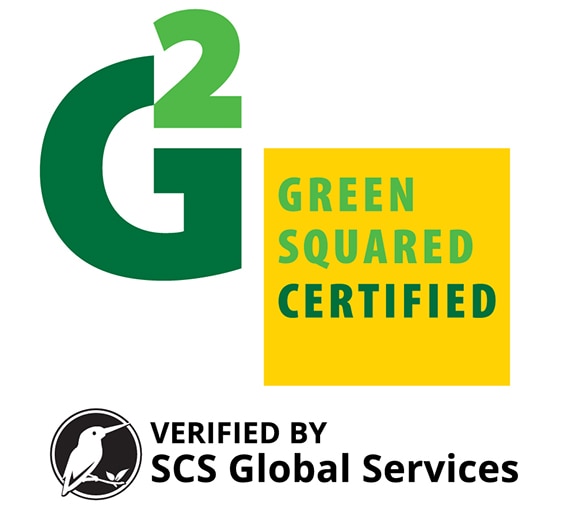As the demand for environmentally responsible products grows, sustainability has evolved from a simple concept to a vital commitment to our planet's future. Our dedication to obtaining and upholding sustainability certifications reflects our passion for eco-friendly practices, from the ethical sourcing of raw materials to reducing our carbon footprint. These certifications not only underscore our environmental responsibility but also assure our customers that their choices support global sustainability efforts. Explore our certifications below to learn more.
WE’VE GOT THE GREEN SQUARED STAMP OF APPROVAL!
WE’VE GOT THE GREEN SQUARED STAMP OF APPROVAL!
We are proud to announce that all our products produced in North America have been awarded the esteemed Green Squared Certification! This certification confirms that our tiles meet the most rigorous sustainability criteria throughout their lifecycle. Whether you're selecting tiles for a cozy home or a major commercial project, you can trust that our certified products are both sustainable and stunning.
Green Squared Certification stands as the leading sustainability benchmark in the tile industry, encompassing everything from the initial extraction of raw materials to the final disposal of the product. Developed by the Tile Council of North America (TCNA), this certification guarantees that our products are not only beautiful but are also produced with a commitment to environmental and social ethics.
CERTIFICATIONS BY PLANT
THE GREEN SQUARED CERTIFICATION PROCESS
Manufacturer Applies for Certification
The certification body carefully assesses whether the product meets ANSI A138.1 standards through a detailed evaluation of the product, the organization, and the facility, following Green Squared Certification Criteria.
After verifying full compliance with the ANSI A138.1 standard, the certification body grants the manufacturer permission to display the Green Squared certification mark on the product.
WHY GREEN SQUARED MATTERS
Green Squared is the tile industry’s most comprehensive sustainability certification, providing a straightforward standard and a recognizable mark that ensures products adhere to demanding, performance-based sustainability requirements. Certified by global third-party evaluators, Green Squared assures that products meet the rigorous standards set forth in ANSI 138.1, making them perfect for eco-friendly building projects.
FREQUENTLY ASKED QUESTIONS
-
What is the purpose of green squared
With Green Squared, architects, specifiers, and consumers can choose products knowing that their sustainability needs are being met. It serves as the North American industry's unified and consistent interpretation of how to validate product sustainability. With the easily-recognizable Green Squared Certified mark, end users can rest assured that certified product meet the industry's broad range of sustainability criteria. -
The Green Squared StandardThe standard on which Green Squared is based is ANSI A138.1 American National Standard Specifications for Sustainable Ceramic Tiles, Glass Tiles, and Tile Installation Materials. Like other ANSI standards, A138.1 is a voluntary standard written and approved by an ANSI Accredited Standards Committee (ASC A108) which represents a diverse range of stakeholders. The ASC A108 stakeholders include green building community leaders, tile consumers, manufacturers, distributors, installers, and several others.
-
What Products Are Covered By Green Squared?
The Green Squared standard, ANSI A138.1, is applicable to most products which are used in tiling systems. This makes possible the specification and installation of systems of products which meet a common host of sustainability criteria. The following products are within the scope of the standard and are eligible for Green Squared certification if they conform to the ANSI A138.1 criteria:
Ceramic Tiles and Glass Tiles
- Porcelain, Pressed Floor, Quarry, Mosaic, and Glazed Wall Tiles
- Cast Glass, Fused Glass, and Low Temperature-Coated Glass Tiles
-
What Are The Sustainability Criteria For Green Squared?
The Green Squared standard, ANSI A138.1, takes a multi-attribute approach towards sustainability, establishing criteria which address both environmental and social issues. These criteria, which are specific to the tile industry, are relevant for products throughout their entire life cycle and are in accordance with the North American green building industry's practices, expectations, and leading initiatives. The criteria are spread across five sections:
General Environmental Characteristics (product characteristics)- Environmental Product Manufacturing (including raw material extraction)
- End of Product Life Management
- Progressive Corporate Governance (associated with the product)
- Innovation
Some criteria within each of these sections are mandatory, and others are elective. To meet the standard, a product must meet all mandatory requirements and a certain number of elective requirements.
-
How Is Green Squared Related To LEED
Green Squared is recognized under LEED Pilot Credit, "Certified Multi-Attribute Products and Materials." This credit awards one LEED point to a project if a certain percentage of building products are certified to meet their relevant industry sustainability standards. With Green Squared listed in LEED as the appropriate standard/certification program for the tile industry, use of Green Squared Certified tile and installation materials can contribute toward earning the point. Click here to review the technical provisions of this credit.
TRANSPARENCY WITH DECLARE
Declare functions as a transparency label for products, offering a platform for ingredient disclosure that ensures our tiles are free from red list ingredients.
Created by the International Living Future Institute (ILFI), Declare enhances product transparency and empowers consumers to make informed decisions. It also supports green building standards like LEED and WELL, aligning with the ILFI’s mission to foster a socially equitable, culturally enriched, and ecologically restorative society.
DECLARE CERTIFICATIONS
FREQUENTLY ASKED QUESTIONS
-
What Are Red List Chemicals?
Declare screens a product’s ingredients directly against the Living Building Challenge (LBC) Red List, saving project teams from the arduous task of vetting products by hand. The LBC Red List contains the “worst in class” materials, chemicals and elements known to pose serious risks to human health and the greater ecosystem that are prevalent in the building products industry.
-
How Does Declare Help With Project Specifications?
Regardless of building certification type, Declare can serve as a valuable framework to inform specification of healthy products in your project. Check out ILFI’s Materials Guidance and Specification Guidebook for more information about how to meet the product-related requirements of the Living Building Challenge. -
What is The Living Product Challenge?
Living Product Challenge is the world’s most advanced standard for healthy, sustainable products. The Living Product Challenge is a framework for manufacturers to create products that are healthy and give back more than they take. Manufacturers are using the Living Product Challenge to rethink the way products are made, creating things that have a positive impact on people and the environment.





